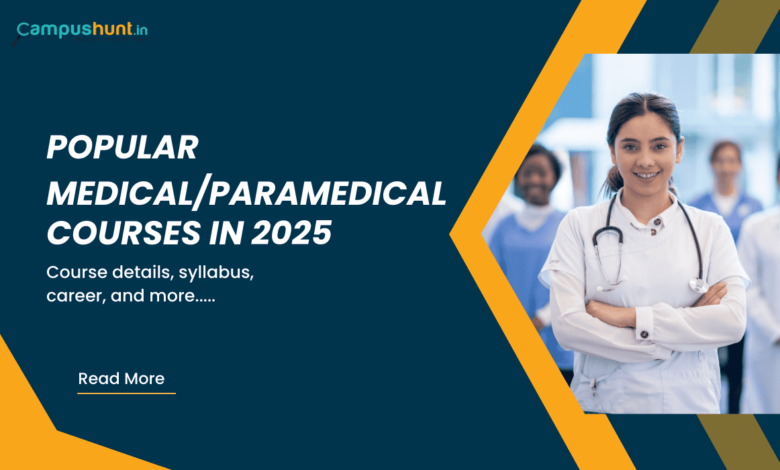Popular Medical/paramedical Courses in 2025

As healthcare continues to evolve, the need for skilled medical and paramedical professionals has never been more critical. Looking ahead to 2025, we are at a unique crossroads where technological advancements, an aging population, and heightened awareness of health and wellness are reshaping the healthcare landscape. These shifts are opening up exciting educational opportunities in both traditional and emerging healthcare fields. Innovations like telemedicine, artificial intelligence, and personalised medicine are revolutionising the way healthcare is provided. As a result, there’s an increasing demand for a new generation of professionals who are not only skilled in traditional practices but also equipped to navigate cutting-edge technologies. This surge in technological progress has driven the popularity of courses that blend classic healthcare education with the latest advancements.
From nursing and medical laboratory science to newer fields like health informatics and physiotherapy, students now have access to a broad range of educational pathways tailored to diverse interests and career goals. In addition, the growing emphasis on holistic, preventive care and efficient emergency response systems has raised the profile of paramedics and emergency medical technicians (EMTs), making these roles integral to community health.
Bachelor of Medicine, Bachelor of Surgery (MBBS)
The MBBS degree is one of the most respected qualifications in India, serving as the foundation for a career as a physician or surgeon. Typically spanning five and a half years, the program includes a mandatory year of internship, where students gain hands-on clinical experience. The curriculum is designed to provide a deep understanding of the human body, the mechanisms behind diseases, and the methods used for diagnosis and treatment. The MBBS course in India typically spans five and a half years, consisting of four and a half years of academic education followed by a one-year mandatory internship.
In India, MBBS courses are offered by a variety of medical colleges accredited by the Medical Council of India (MCI). Admission to these institutions is highly competitive, with selection based primarily on performance in the NEET (National Eligibility cum Entrance Test), a nationwide entrance exam. The course combines theoretical learning with practical training and clinical exposure across various specialties such as general medicine, surgery, paediatrics, and gynaecology. After completing the MBBS program, graduates must register with the MCI or their state medical council and complete an internship to gain practical experience. An MBBS degree opens the door to diverse career opportunities, including clinical practice, specialisation through postgraduate studies, and roles in research or academia.
Bachelor of Dental Surgery (BDS)
The Bachelor of Dental Surgery (BDS) is the primary undergraduate qualification for those looking to pursue a career in dentistry. This five-year program combines theoretical education with practical training, covering all essential aspects of dental care. The BDS program lasts five years, including four years of academic study and a one-year compulsory rotating internship.
Admission to BDS programs in India also requires passing the NEET exam, which ensures students have the necessary knowledge to succeed in dental education. The curriculum includes subjects like oral anatomy, dental materials, periodontology, and prosthodontics. In addition to classroom learning, students undergo extensive clinical training, where they perform dental procedures on real patients under supervision. Upon completion of the BDS course, graduates must register with the Dental Council of India (DCI) or their state dental council to practice. Many BDS graduates opt for further specialization in areas like orthodontics, oral maxillofacial surgery, or pediatric dentistry, allowing them to deepen their expertise and expand their career opportunities.
Bachelor of Pharmacy (BPharm)
The Bachelor of Pharmacy (BPharm) is a four-year undergraduate program aimed at those interested in the pharmaceutical field. Unlike MBBS and BDS, which focus directly on patient care, the BPharm degree delves into the science behind drug development, formulation, and ethical pharmacotherapy. Admission to BPharm programs typically involves entrance exams, which may be state-specific or administered by universities. The course content includes pharmaceutical chemistry, pharmacology, toxicology, and clinical pharmacy, providing a comprehensive understanding of how drugs work, how they are dispensed, and their role in patient care. Students also participate in internships to gain hands-on experience in areas like medication dispensing, managing pharmaceutical supplies, and navigating regulatory processes. Graduates of BPharm have a variety of career paths available to them. They can work in community pharmacies, hospitals, pharmaceutical companies, regulatory agencies, or pursue further studies such as a Master of Pharmacy (MPharm) or an MBA in healthcare management. With the increasing demand for healthcare professionals, BPharm graduates are well-positioned for a fulfilling and dynamic career in the healthcare sector.
Doctor of Pharmacy (Pharm D)
The Doctor of Pharmacy (Pharm D) is a comprehensive six-year doctoral program designed for students aspiring to become licensed pharmacists. The course is structured to include five years of in-depth academic study followed by a one-year internship, which provides hands-on experience in various healthcare settings. The curriculum covers subjects like pharmacology, pharmaceutical chemistry, medicinal chemistry, pharmacognosy, and clinical pharmacy. A key focus of the program is patient care, where students learn to manage medications, educate patients, and collaborate with healthcare teams to ensure optimal therapeutic outcomes.
In India, Pharm D programs are regulated by the Pharmacy Council of India (PCI) and are offered by numerous universities and colleges across the country. Upon completing the program, graduates can pursue diverse career opportunities in hospitals, community pharmacies, pharmaceutical companies, academia, and research institutions. With the increasing demand for healthcare services and personalized medication management, Pharm D graduates are playing a pivotal role in improving patient care and medication safety.
Bachelor of Science in Nursing (BSc Nursing)
The Bachelor of Science in Nursing (BSc Nursing) is a four-year undergraduate program aimed at preparing students to become skilled, compassionate, and professional nurses. The course blends theoretical knowledge with practical training, equipping students with the necessary skills to care for patients across a wide range of healthcare settings. The curriculum includes subjects such as anatomy, physiology, microbiology, nutrition, and pharmacology, as well as specialized nursing courses in areas like pediatric nursing, mental health nursing, and community health nursing. In India, BSc Nursing programs are offered by a variety of colleges and universities, following the guidelines set by the Indian Nursing Council (INC). Graduates of this program have a broad range of career options, including roles in hospitals, clinics, educational institutions, and non-governmental organizations. Many BSc Nursing graduates also choose to further their education by specializing in areas like critical care, neonatal nursing, or oncology nursing, expanding their career prospects and making a significant impact on patient care.
Bachelor of Physiotherapy (BPT)
The Bachelor of Physiotherapy (BPT) is a four-and-a-half-year undergraduate program, which includes a mandatory six-month internship. The course focuses on understanding human anatomy and physiology, exercise therapy, electrotherapy, and rehabilitation techniques. The curriculum is designed to blend theoretical knowledge with practical experience, allowing students to apply what they’ve learned in real-world settings.
Physiotherapy is a rapidly growing field in India, with increasing recognition of its role in rehabilitation and pain management. BPT programs prepare students to assess and treat a wide range of physical conditions, including musculoskeletal, neurological, and sports injuries. Graduates can work in hospitals, rehabilitation centers, sports clinics, or private practice. Many also pursue further specialization in areas like orthopedic physiotherapy, sports physiotherapy, or pediatric physiotherapy, broadening their expertise and enhancing their career opportunities. With the demand for physiotherapists continuing to rise, BPT graduates have the chance to make a meaningful difference in the lives of their patients by helping them regain mobility, function, and quality of life.
Bachelor of Ayurvedic Medicine and Surgery [BAMS]
BAMS is a professional undergraduate course that integrates the principles of Ayurveda, the ancient Indian system of medicine, with modern medical science. The course typically spans five and a half years, including an internship period, and is designed to equip students with the knowledge and skills necessary to practice Ayurveda effectively. The curriculum covers a wide range of topics, including but not limited to Ayurvedic anatomy, physiology, pharmacology, pathology, and surgery. Students are also introduced to modern medical science to enable a holistic understanding of both Ayurvedic and allopathic practices. Extensive practical training is emphasized, allowing students to gain hands-on experience in various therapeutic techniques, herbal formulations, and Panchakarma (detoxification processes in Ayurveda).
Graduates of BAMS can pursue careers as Ayurvedic doctors, consultants in wellness and holistic healthcare, researchers, and educators. Opportunities also exist in government health services, private hospitals, and wellness centers, as well as in the pharmaceutical sectors focusing on Ayurvedic products.
Bachelor of Veterinary Science
The Bachelor of Veterinary Science (BVSc) is a 5-year undergraduate degree program that trains students in veterinary medicine, enabling them to diagnose and treat diseases in animals. The program emphasizes animal health, welfare, and the principles of veterinary science. Students in BVSc study subjects such as veterinary anatomy, microbiology, pathology, surgery, pharmacology, and animal husbandry. The program includes extensive practical exposure, allowing students to work with various animal species, understand clinical practices, and conduct research. The curriculum also emphasizes the importance of ethics, animal welfare, and zoonotic diseases, which are diseases transmissible from animals to humans. Graduates of BVSc become licensed veterinarians and have the opportunity to work in private practice, government agencies, research institutions, and animal welfare organizations. They may also engage in areas such as veterinary public health, animal breeding, nutrition, and pharmaceutical companies focusing on animal healthcare products.
Bachelor of Occupational Therapy
The Bachelor of Occupational Therapy (BOT) is a professional undergraduate degree aimed at training therapists who specialize in improving the quality of life for individuals with physical, emotional, or developmental conditions. Typically conducted over four years, the program focuses on rehabilitation and enabling individuals to engage in meaningful activities and daily living skills. The BOT curriculum includes subjects such as human anatomy, psychology, occupational therapy theories, assessment techniques, and therapeutic interventions. Practical training is integral, with students undertaking internships in hospitals, rehabilitation centers, schools, and community settings to develop their skills in real-world environments.
BOT graduates can work in various healthcare settings, including hospitals, rehabilitation centers, schools, and private practice. They can specialize in areas such as pediatric occupational therapy, geriatric care, mental health, and community rehabilitation. Additionally, they may become involved in research, education, and policy-making to help advance the field of occupational therapy.
Bachelor in Audiology and Speech-Language Pathology (BASLP)
The BASLP program is designed to train professionals in the fields of audiology and speech-language pathology, focusing on the assessment, diagnosis, and management of communication disorders and hearing impairments. The course typically spans four years, including theoretical knowledge, practical training, and clinical internships.
Curriculum Overview:
- Core Subjects: Anatomy and Physiology of Speech and Hearing, Speech and Language Development, Audiology, Speech Disorders, and Rehabilitation.
- Practical Training: Students undergo hands-on training through workshops, clinical sessions, and internships in hospitals, special schools, and rehabilitation centers.
- Research and Project Work: Emphasis is placed on research methodologies, enabling students to engage in evidence-based practice.
Graduates of BASLP can explore varied roles, such as audiologists, speech-language pathologists, clinical researchers, and academics. Employment opportunities are available in hospitals, rehabilitation centers, schools, and private practices, addressing the increasing demand for professionals trained to support individuals with communication and hearing impairments.
Bachelor of Science in Radiography
The Bachelor of Science in Radiography focuses on the principles and techniques of radiography, preparing students to use advanced imaging technologies to assist in diagnosing and treating medical conditions. This program generally lasts for three to four years and combines theoretical learning with practical skill development.
Curriculum Overview:
- Core Subjects: Medical Imaging, Radiographic Techniques, Radiobiology, Radiation Protection, and Imaging Equipment.
- Hands-On Experience: Students receive training in various imaging modalities, including X-ray, MRI, CT scans, and ultrasound. Clinical internships are a crucial part of the program, allowing students to work alongside healthcare professionals.
- Emerging Technologies: The curriculum also addresses advancements in radiographic technology, informing students about innovations like digital imaging and tele-radiology.
Professionals with a degree in Radiography can work in hospitals, diagnostic centers, research institutions, and higher education. Job titles may include radiologic technologist, MRI technologist, CT technologist, and educator, making this field highly versatile and in demand in the healthcare system.
Bachelor of Homeopathic Medicine & Surgery (BHMS)
The BHMS program is an extensive undergraduate degree aimed at equipping students with the knowledge and skills necessary to practice homeopathy. This five-and-a-half-year course combines theoretical learning with clinical training, emphasizing holistic treatment approaches.
- Core Subjects: Homeopathic Philosophy, Materia Medica, Organon of Medicine, Homeopathic Therapeutics, Anatomy, Physiology, and Pathology.
- Clinical Training: Students gain practical experience through supervised clinical practice in hospitals and community health settings.
- Research and Ethics: There’s a focus on research, ethics, and public health issues related to homeopathic practices.
BHMS graduates can pursue careers as homeopathic practitioners, educators, health consultants, or researchers in complementary medicine. With a growing interest in alternative therapies, homeopathy has found its place in healthcare, presenting ample opportunities for practitioners to establish successful practices.
Bachelor of Unani Medicine & Surgery (BUMS)
Unani medicine, with its roots in ancient Greek philosophy and a holistic approach to health, is practiced in many parts of the world. The Bachelor of Unani Medicine & Surgery (BUMS) is a five-and-a-half-year undergraduate program that offers an in-depth understanding of Unani healing methods. Recognized by the Central Council of Indian Medicine (CCIM), this course trains students to diagnose, treat, and manage diseases using traditional Unani principles.
Curriculum and Training: The BUMS program covers subjects like anatomy, physiology, biochemistry, and the philosophy of Unani medicine, alongside practical knowledge of medicinal herbs and treatments. Students gain hands-on experience in hospitals and community health centers, learning how to apply Unani practices in real-world clinical settings.
Career Opportunities: Graduates of BUMS can pursue careers as Unani doctors, researchers, or educators. With growing interest in alternative medicine and holistic health, there’s an increasing demand for Unani practitioners. BUMS graduates can set up their own clinics, work in hospitals, or join public health services, contributing to the expanding role of alternative medicine in the healthcare system.
Bachelor of Science in Radiotherapy (B.Sc. Radiotherapy)
As the incidence of cancer rises and medical technology advances, radiotherapy has become an essential part of cancer treatment. The Bachelor of Science in Radiotherapy is a specialized three-year program that trains students to use radiation therapy as part of cancer treatment regimens.
Curriculum and Training: This program covers core subjects such as radiation physics, radiobiology, treatment planning, and patient care. Students get a solid theoretical foundation while also gaining practical experience in operating radiotherapy equipment and developing treatment protocols. Clinical rotations in oncology departments provide real-world experience in patient care and radiation therapy delivery.
Career Opportunities: Graduates of the B.Sc. Radiotherapy program can work in hospitals, cancer treatment centers, or research institutions. As vital members of a multidisciplinary team, radiotherapy technologists collaborate with oncologists, nurses, and medical physicists to provide comprehensive cancer care. With the growing demand for cancer treatment, qualified radiotherapy professionals are increasingly in demand, making this a rewarding and secure career path.
Bachelor of Optometry
Optometry plays a crucial role in maintaining vision health, an essential aspect of overall well-being. The Bachelor of Optometry is a four-year program that prepares students to diagnose and manage visual disorders, offering a solid foundation in eye care.
Curriculum and Training: The optometry course covers subjects like optics, the anatomy of the eye, visual perception, and clinical optometry. Students also receive hands-on training through internships and clinical practice at eye care centers, where they learn to conduct eye exams, prescribe corrective lenses, and provide pre- and post-operative care for vision correction procedures.
Career Opportunities: Graduates of optometry can work in a variety of settings, including private practices, hospitals, optical retail chains, and educational institutions. There are also opportunities to specialize in areas like paediatric optometry or ocular disease. With an aging population and the increasing prevalence of vision impairments, the demand for qualified optometrists is on the rise, making this a stable and rewarding career choice.
Bachelor of Science in Medical Lab Technology
Bachelor of Science in Medical Lab Technology (B.Sc. MLT) is a comprehensive three- to four-year program that prepares students for a career in medical diagnostics. It covers subjects like microbiology, hematology, biochemistry, immunology, and clinical pathology, alongside essential laboratory techniques and equipment operation. Students also gain practical experience in quality control and lab management. Throughout the course, students develop the skills needed to collect, process, and analyze biological specimens, which are crucial for diagnosing and treating a wide range of diseases. The hands-on training, typically conducted in hospitals and laboratories, ensures that students are well-prepared for the real-world challenges of the field.
Graduates of B.Sc. MLT can pursue careers in hospitals, diagnostic labs, research institutions, and public health organizations. As medical lab technologists, they play an integral role in patient care by ensuring timely and accurate diagnoses. With increasing awareness of health issues and the growing demand for diagnostic services, this field offers significant potential for career growth and advancement.
Bachelor of Science in Anesthesia (B.Sc. Anesthesia)
The Bachelor of Science in Anesthesia (B.Sc. Anesthesia) is a critical program for those looking to support medical teams during surgical procedures. This three-year course trains students to assist anesthetists and surgeons with administering anesthesia and monitoring patients throughout surgery. Students study subjects like anatomy, physiology, pharmacology, and various anesthesia techniques. They also learn about patient monitoring and how to manage the risks associated with different types of anesthesia, such as general, regional, and local.
Graduates of this program can work as anesthesia technicians or assistants in hospitals, surgical centers, and emergency services. With the growing demand for surgical procedures in India, there’s an increasing need for skilled anesthesia professionals. Career advancement often leads to roles like anesthesia safety officers, educators, or opportunities to specialize further in anesthesia nursing, making it a rewarding and respected profession.
Bachelor of Science in Forensic Science (B.Sc. Forensic Science)
Bachelor of Science in Forensic Science (B.Sc. Forensic Science) is a unique interdisciplinary program that blends science with law. Spanning three to four years, the program covers essential topics such as criminalistics, toxicology, forensic biology, chemistry, and digital forensics, preparing students to apply scientific principles in criminal investigations. Through practical activities like fingerprint analysis, DNA profiling, and ballistics, students gain hands-on experience working with real evidence, often in collaboration with law enforcement agencies during internships. The course sharpens critical thinking, analytical skills, and a solid understanding of the legal aspects of forensic investigations. Graduates of forensic science can pursue diverse career opportunities in crime laboratories, law enforcement agencies, and research institutions. Forensic scientists play a vital role in the criminal justice system, assisting in crime investigations and the prosecution of offenders. The increasing focus on crime scene investigations and the use of technology in forensic analysis has further strengthened the demand for skilled professionals in this field, offering exciting career prospects.
Bachelor of Science in Respiratory Therapy
The Bachelor of Science in Respiratory Therapy is a specialized course designed to train students in the assessment, treatment, and management of patients with respiratory disorders. This program typically spans three to four years and incorporates a blend of theoretical knowledge and practical training.
- Students generally undertake subjects such as anatomy, physiology, pharmacology, respiratory care technologies, and clinical practice.
- The course includes extensive hands-on training in hospital settings, where students learn to operate advanced respiratory equipment, perform diagnostic tests, and administer therapies.
- Additional topics may cover areas like pulmonary rehabilitation, critical care, and neonatal/pediatric respiratory care.
Graduates can explore diverse employment opportunities in hospitals, rehabilitation centers, home healthcare facilities, and research institutes. They can work as respiratory therapists, clinical instructors, or pursue advanced studies in related fields.
Bachelor of Science in Neuroscience
The Bachelor of Science in Neuroscience is an interdisciplinary program that focuses on the complexities of the nervous system, emphasizing both the biological and psychological aspects of brain function. This degree is increasingly popular in India, thanks to its relevance to various fields including medicine, psychology, and research.
- The program typically covers foundational subjects like neuroanatomy, neurophysiology, cognitive neuroscience, and neuropsychology.
- Students are introduced to laboratory techniques, research methodologies, and the latest advancements in neuroscience, including neuroimaging and neuroinformatics.
- Many institutions encourage internships and projects that provide exposure to practical applications and research in the field.
Graduates can pursue careers in healthcare institutions, research labs, educational institutions, and pharmaceutical companies. They may work as research assistants, clinical neuropsychologists, or continue their studies in specialized areas such as neurobiology or neurology.
Bachelor of Science in CVT (Cardiovascular Technology)
The Bachelor of Science in Cardiovascular Technology focuses on the study and management of cardiovascular diseases, with an emphasis on diagnostic and therapeutic techniques. This program prepares students for roles in the fast-evolving field of cardiac care.
- Students learn core topics such as cardiovascular anatomy, electrocardiography (ECG), echocardiography, interventional procedures, and patient care management.
- The course includes rigorous practical training with the latest diagnostic tools and technologies that are essential for cardiovascular assessment.
- Clinical rotations in hospitals are integral, enabling students to gain firsthand experience in patient care and diagnostic workflows.
Graduates can work as cardiovascular technologists, cardiac sonographers, or clinical researchers. Opportunities exist in hospitals, diagnostic labs, and cardiac rehabilitation centers, with the option to further specialize in specific cardiovascular interventions or advanced clinical trials.
Bachelor of Science in Perfusion (B.Sc. Perfusion)
The Bachelor of Science in Perfusion (B.Sc. Perfusion technology) is a specialized program designed to train students to operate cardiopulmonary bypass machines and other critical technologies during cardiac surgeries. This three-year course combines theoretical knowledge with hands-on experience, equipping students to manage complex situations in the operating room. The curriculum includes subjects like physiology, anatomy, pharmacology, and the principles of perfusion technology. Students gain practical experience by simulating real-life surgical scenarios, learning how to monitor patients’ vital signs, manage blood flow, and operate advanced perfusion equipment. This training ensures that graduates are prepared to take on the high-pressure role of managing a patient’s circulation during heart surgery.
After completing the program, graduates can find rewarding careers in hospitals, cardiac care units, and research institutions. As the demand for cardiac surgeries grows in India, the need for trained perfusionists is rising, making this a critical and in-demand profession in the healthcare sector.
Bachelor of Science in Renal Dialysis (B.Sc. Renal Dialysis)
The Bachelor of Science in Renal Dialysis (B.Sc. Renal Dialysis) is a crucial program focused on training healthcare professionals to care for patients with kidney-related issues. This three-year degree program provides students with deep knowledge of renal physiology, dialysis techniques, and the essential skills needed for patient care and management. The curriculum covers various dialysis modalities, including hemodialysis and peritoneal dialysis, as well as topics like patient care, diet management, and clinical procedures. Students gain practical experience through internships in specialized nephrology departments, where they work alongside experienced professionals to learn the intricacies of dialysis care.
With the increasing prevalence of renal diseases in India, especially due to lifestyle-related health issues, there is a growing demand for qualified renal dialysis professionals. Graduates of this program can pursue careers in hospitals, dialysis centers, and clinics, playing a vital role in improving the lives of patients with chronic kidney conditions.
General Nursing and Midwifery (GNM)
The General Nursing and Midwifery (GNM) program is an essential course for anyone aspiring to become a nurse. This three-year program equips students with the skills and knowledge needed to provide comprehensive patient care, with a particular focus on community health nursing, maternal and child health, and health promotion. The curriculum covers a wide range of subjects, including anatomy, physiology, nutrition, microbiology, and nursing administration. Students receive practical training in diverse healthcare settings, including pediatrics, surgery, psychiatry, and obstetrics, gaining hands-on experience in delivering quality care across different departments. The program also fosters important skills like critical thinking, effective communication, and compassionate patient care.
Graduates of the GNM program can work in a variety of healthcare environments, such as hospitals, clinics, and community health centers. They play a key role in educating patients, performing nursing procedures, and supporting recovery. With the increasing global focus on healthcare quality and the growing demand for nursing professionals, GNM graduates enjoy a wide range of career opportunities, both in India and abroad.
Bachelor of Science in Nursing (Post-basic)
The Bachelor of Science in Nursing (Post-Basic) is a specialized program designed for already registered nursing professionals. This course aims to enhance the skills and knowledge of nurses to prepare them for advanced roles in patient care, leadership, and healthcare management. The course typically spans two years, focusing on both theoretical and practical training to equip students with the necessary skills. To enroll in this program, candidates must have a Diploma in Nursing (GNM) and must be a registered nurse with the Indian Nursing Council or any state nursing council. The curriculum includes subjects like advanced nursing practice, community health nursing, nursing research, management, and ethics in nursing. Additionally, practical experiences in hospitals and community settings are integral to the program, allowing students to apply theoretical knowledge in real-world scenarios.
Graduates of the Post-Basic B.Sc. Nursing can pursue various roles, including clinical nurses, nursing educators, nursing administrators, and specialists in community health. The demand for qualified nurses is high in hospitals, educational institutions, and various healthcare settings, both in India and abroad.
Bachelor of Science in Radiology
The Bachelor of Science in Radiology focuses on training students to become skilled radiologic technologists. This program encompasses the study of medical imaging techniques and the use of radiology in diagnostics and treatment. This undergraduate degree typically takes three years to complete, integrating both classroom instruction and essential hands-on training in clinical settings.
Candidates seeking admission to this program must have completed their 10+2 level of education with physics, chemistry, and biology as core subjects. Some institutions may also require a qualifying entrance exam. The curriculum of the B.Sc. in Radiology covers several critical areas, including anatomy, radiographic technology, imaging techniques (like X-rays, CT scans, and MRIs), radiation physics, and patient care. Students also gain practical experience through clinical rotations in hospitals and imaging centers. Graduates with a Bachelor of Science in Radiology find a plethora of opportunities in both public and private healthcare sectors. They can work as radiologic technologists, MRI technologists, CT technologists, and ultrasound technicians. Moreover, they may find positions in research facilities, teaching institutions, and in the development of imaging technologies.
Conclusion
As we look toward 2025, the future of medical and paramedical education is set to transform in response to the evolving challenges of global health, rapid technological progress, and the increasing focus on patient-centered care. The growing demand for skilled healthcare professionals highlights the need for specialized programs that not only provide a strong theoretical foundation but also offer practical, hands-on experience essential for delivering high-quality care. A key trend in 2025 is the rise of courses that blend traditional medical training with cutting-edge technology. Fields like telemedicine, health informatics, and data analytics are becoming integral parts of medical education, capturing the attention of students eager to engage with the latest healthcare innovations. The COVID-19 pandemic accelerated the shift toward remote healthcare, underscoring the importance of digital tools in making healthcare more accessible and efficient. As a result, training programs are increasingly designed to equip future healthcare professionals with the skills to navigate and leverage these technologies, ensuring they are prepared for the digital future of medicine. This shift marks a broader recognition of the role of technology in enhancing healthcare delivery and meeting the growing demand for accessible, high-quality care.






